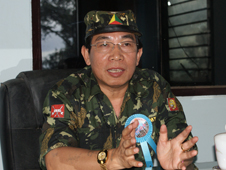The retirement of Lt Gen Yawd Serk adds some uncertainty to the path towards nationwide peace, as a draft multilateral peace agreement garners support among most of Burma’s armed ethnic groups.
Yawd Serk is the founder of the Restoration Council of Shan State (RCSS) and armed wing (SSA-S), one of only two armed ethnic organisations that have yet to sign onto the plan (the other being the United Wa State Army).
In 2011 Yawd Serk led the SSA-S to sign a unilateral ceasefire with the Burmese government. While ongoing skirmishes between the Burma Army and SSA troops have reiterated the need for a multilateral agreement inclusive of all armed groups, the RCSS/SSA-S have continued private discussions with Naypyidaw, citing the United Nationalities Federal Council’s inclusion of rival Shan organisations as a stumbling block for participation.
Speaking to DVB at RCSS/SSA-S headquarters at Loi Tai Leng, Yawd Serk affirmed the positive steps his organisation has made in its relations with the government since President Thein Sein came to office in 2011.
“We believe that President Thein Sein is an honest person,” said Yawd Serk. “We trust him, and we also want peace, so we are continuing to work on an agreement with him.”
Yet according to Yawd Serk, striking a deal with the Burmese government is only half the challenge. A permanent agreement with the government, he said, may not guarantee an end to the fighting. While trust has been built between Thein Sein and ethnic leaders, a perceived discrepancy between Presidential edicts and military operations has made parties watchful.
“When the Burmese military was fighting the KIO,” he said, “President Thein Sein himself issued an order for the fighting to stop, yet it continued.
“The ceasefire was signed between the RCSS and the government, but the clashes are between our troops and the Burmese military. So we think that there might be some problems between the Burmese government and military.”
[related]
Such a split has made it difficult to negotiate and has the potential to sully the reputation Thein Sein has established for himself among ethnic leaders:
“Either there is a genuine split between the government and military, or such a perceived split is actually a strategic effort designed to confuse us,” Yawd Serk continued.
However, such confusion has not dented the conciliatory approach that the Lt. Gen has brought to the bargaining table.
The RCSS has played an large role in Burma’s reconciliation, notably by pushing for the government’s recognition of the 1947 Panglong agreement that guaranteed autonomous internal administration for the Frontier Areas and the right to secede from the Union of Burma after a period of ten years.
The Panglong Agreement was shelved under Gen Ne Win’s leadership but has remained an important goal of many armed groups.
When asked if the RCSS/SSA is still pushing for recognition of the Panglong Agreement, Yawd Serk said, “If we stood firmly on such a position, the government would not be able to accept our conditions. So, if we want peace, we must compromise. We are now asking for self-determination – that is, we would like to join a general union.”
With that goal the RCSS/SSA is looking towards the 2015 general elections — but not without constitutional amendments — they say.
“We want it [the Constitution] to be in accordance with democratic principles,” he said, “and we want it to express that all ethnic nationalities have equal rights”.
The schism between politicians and army generals suggests that until such constitutional change is achieved, political dialogue between the RCSS and the Burmese government may well be coloured by the path that the SSA-S and the Burmese military have tread.



